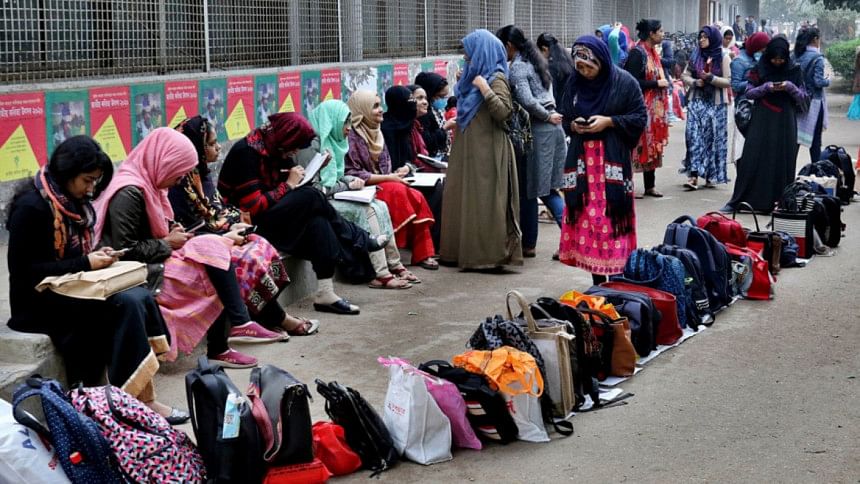Government job recruitment: Is the age limit of 30 years a rational policy?

Young people in Bangladesh have been demanding the revision of a few public recruitment policies for some time now. Their demand for revising the quota policy was met, and they are currently striving to raise the eligibility age ceiling from 30 to 35 years. But, it is unfortunate that revising a policy requires chaos rather than research.
About 90 percent of Bangladesh's employment is in the informal sector, which provides almost no stable earnings and economic security. In the remaining 10 percent, which consists of the formal private and public sectors, a large segment of private sector jobs does not provide decent working conditions, earnings, and social security. Public sector jobs ensure basic benefits, which makes individuals want them more. Preferences for public sector jobs intensified in recent times, particularly after the pay scale was doubled in 2015.
The public sector covers less than five percent of total employment in Bangladesh and is unable to absorb a large pool of interested candidates. Instead, it may affect human capital development by diverting investment, prolonging unemployment by keeping candidates engaged in the preparation process, and crowd out private sectors in getting efficient human resources. To minimise these harmful effects, the government applies an age ceiling for recruitment, which was revised from 27 to 30 years in 1991.
Beyond the eligible age, obtaining jobs in other sectors would not be easy if the public sector job preparation could not be utilised for other sectors. Human capital or brain gain may result from the preparation for public service exams if said preparation is useful in obtaining a non-government job as well. This is supported by some literature on international migration that indicates that migrant-sending countries enjoy brain gain rather than brain drain, because investment takes place on human resources in the hope of migration, but not all of those who prepare can emigrate, and some are left in their home countries with higher capabilities.
A survey indicates some gains from public sector preparation: about 32 percent of 105 respondents who were preparing or had prepared for government jobs at the time of the survey found the preparation "very" or "extremely" useful for other jobs, while the rest of the respondents found it somewhat useful (40 percent) or not useful at all (28 percent).
My review of the preparation materials for public service in Bangladesh does not indicate much value addition. Candidates generally study Bangla and English language and literature, general knowledge of Bangladesh and global affairs, and general science for government job preparation. Even if studying these materials generates some human capital gain, the gain appears to be trivial compared to the high cost of preparation.
With the goal of getting attractive government jobs, jobseekers are likely to delay searching for and taking up other opportunities, repeatedly try for public sector jobs until they become ineligible, and incur substantial direct and indirect costs related to the preparation. In the survey, the median number of exam attempts was 13 for a candidate, and the median number of hours spent was 1,116. The time spent on preparation is equivalent to 28 work weeks if we consider full-time work as 40 hours in a week. The median of total monetary costs is close to that of the monthly income for those who had studied for government jobs in the past and about four times the median monthly income for those who were currently preparing.
The survey findings reinforce the notion that the lure of government employment leads people to prepare for jobs they may not get. The demand side of the labour market gets affected by this since job preparation keeps people from proactively taking on entrepreneurial roles and generating employment.
When I spoke to people at different professional forums, some of them were surprised to learn that such an age restriction policy exists. Some of them asked me about what happens when a woman's eligibility expires due to giving birth or when someone is sick. These serious issues are not considered in our public sector recruitment process.
To avoid the negative consequences of seeking government jobs, in the short run, a restriction on the number of times a candidate can apply would be preferable to the age ceiling, considering other factors such as the variation of the number of years for university graduation, discrimination against older candidates, and special conditions such as sickness and pregnancy. In the long run, achieving optimum wages and other benefits for the entire labour market, keeping no public vs private segmentation, would be a more sustainable and efficient approach to create a vibrant economy and ensure the quality of work and life for all.
Shahida Pervin is PhD researcher at the National Graduate Institute for Policy Studies (GRIPS) in Tokyo, Japan.

 For all latest news, follow The Daily Star's Google News channel.
For all latest news, follow The Daily Star's Google News channel. 



Comments